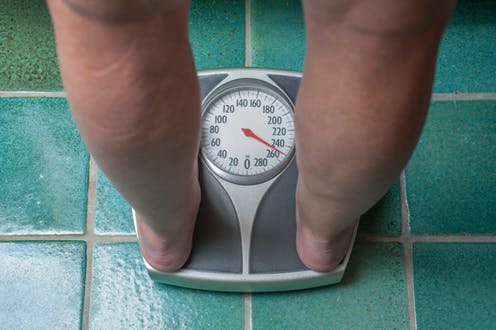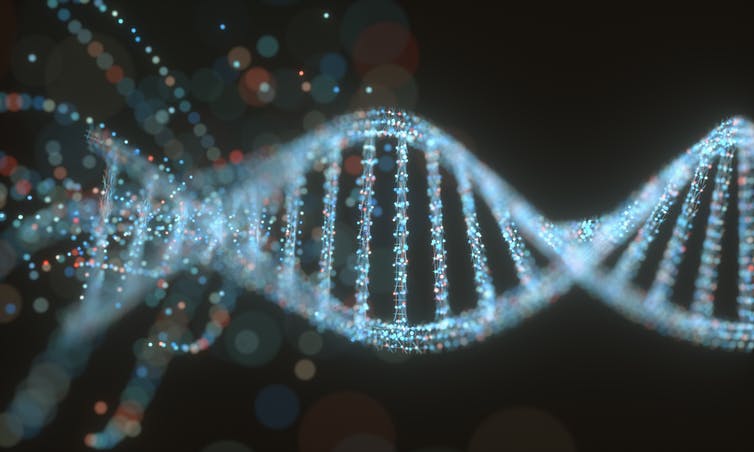
There’s long been a debate about whether genetics or the environment people are raised in is the biggest cause of obesity.
Obesity rates have tripled since the 1980s. This is far faster than our genetics could change, suggesting there’s an important environmental element to obesity.
But we also have studies which show that identical twins tend to be more similar in their body weight than non-identical twins, suggesting there’s a genetic element to weight.
Further complicating this debate is the fact that there’s evidence that the influence of genetics may change as people age. For example, when it comes to intelligence, genes seem to be more powerful predictors of intelligence in adults than in children.
Our recent study has shown that this is also true of body weight. We found that the amount of influence your environment or genetics may have on whether a person became obese changed throughout their lifetime.
Our study showed that genetics had little link with obesity rates during childhood, but strengthened as people got older (from adolescence to age 69).
A similar pattern was also found when it came to a person’s body weight and social background. We found that people from disadvantaged backgrounds had a higher weight from adolescence onwards. However, there was almost no difference in infancy or childhood.
But, as people got older, we also noticed differences in their weight that couldn’t be explained by genetics or social background. This meant that neither of those factors is a good predictor of any particular person’s body weight.
To conduct our study, we used data from the MRC National Survey of Health and Development. This tracked an initial sample of 5,362 people from when they were born in 1946 until the present day.
We used this data to study how genes and social disadvantage are linked with body weight from age two to 69. We studied social disadvantage in particular as it’s thought to be an important environmental risk factor for obesity and may contribute to other forms of health inequality.
We summarised a person’s genetic risk into what’s known as a “polygenic score”, a summary of all the genes a person has that are linked with higher body weight.
To capture social background, we used the participants’ social class at age four. This was measured using the Registrar General’s Social Class, which categorised participants’ social background based on their father’s class (on a scale from professional to unskilled).

ktsdesign/ Shutterstock
We found that those with a greater number of obesity-related genes had higher body weight. Those in the top 25% for genetic risk of obesity were 11.2kg heavier at age 63 than those in the bottom 25% of genetic risk. People who were from the most disadvantaged homes in childhood were 7.4kg heavier on average than those from the most advantaged backgrounds by age 63.
While these are large differences in body weight, our results suggest that neither genetics nor social background is a good predictor of whether or not a person will become obese. While weight differences increased substantially as participants got older, genetic risk only predicted 10% and social background 4% of these differences.
This shows us that there’s still much about body weight that we can’t explain with genetics or social disadvantage, suggesting other factors also have an important influence on our body weight.
Predicting body weight
It’s important to note the limitations of our work. We focused on only one generation, and their experiences are very different from other generations.
For example, people born in 1946 would have been exposed to rationing in early childhood. More recent generations also have much higher levels of obesity (most notably in childhood) than previous ones. In future work, it will be interesting to look at whether the results of our study are different in more recent generations.
We also only examined part of a person’s genetic risk – and the most common genes linked with body weight. However, some rare genes may have a big effect on a person’s body weight, so it will be important for future research to investigate those.
Finally, measuring social disadvantage is challenging. The vast differences in how social advantage and genetic risk are measured makes it difficult to truly compare the influence of them on body weight.
We have no control over our genetics, nor the social background we are born into. And yet these factors may be influencing us almost 70 years after we’re born.
The fact that we may be influenced by factors outside our control could help us to reflect on why some people find it difficult to lose weight or avoid gaining it. It may also help us understand why policies to tackle obesity have usually relied on people’s will power, rather than making changes to the food environment haven’t worked very well.
Our research also suggests that neither genes nor social background are destiny. This could help to empower us when we try to maintain a healthy body weight, especially for those who may have struggled in the past.
![]()
David Bann receives funding from the Economic and Social Research Council (grant number ES/M001660/1) and the Medical Research Council (MR/V002147/1). The funders had no role in study design, data collection and analysis, decision to publish, or preparation of this work.
NMD works in a unit that receives support from the University of Bristol and the UK Medical Research Council (MC_UU_00011/1) and is supported by a Norwegian Research Council Grant number 295989. The funders had no role in study design, data collection and analysis, decision to publish, or preparation of the manuscript.
Liam Wright does not work for, consult, own shares in or receive funding from any company or organisation that would benefit from this article, and has disclosed no relevant affiliations beyond their academic appointment.





























